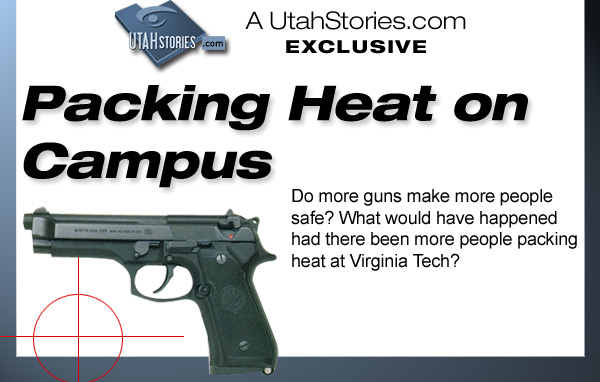Utah laws complex, confusing on carrying guns on USU campus
March 15th, 2011 Posted in OpinionBy Jess Allen
LOGAN—Who’s packing heat on campus?
The answer to that is anyone’s guess, said USU Police Chief Steve Mecham, who said he doesn’t even have any idea how many USU students, staff and faculty have legal concealed-weapon permits, let alone who is actually carrying.
 “I interpret [the law] as most college campuses in the state interpret it—that you have a concealed weapon permit you must carry [the weapon] concealed,” Mecham said.
“I interpret [the law] as most college campuses in the state interpret it—that you have a concealed weapon permit you must carry [the weapon] concealed,” Mecham said.
Gun owners with valid state concealed weapon permits can carry their guns on campus as long as they are concealed. “Some gun rights activists would say the law doesn’t say that and so the law is gray in that area,” he said.
During the recently concluded Utah legislative session, Rep. Carl Wimmer of Herriman proposed laws to loosen Utah’s gun laws to do away with permit process, already among the most permissive in the nation.
“It allows law-abiding citizens of Utah to carry a firearm for their own personal self-protection with or without a concealed-weapons permit,” Wimmer said in January, shortly after a gunman in Tucson, Ariz., killed six people, and shot U.S. Congresswoman Gabrielle Giffords.
• Wimmer Bill Gives Utah the First “State Gun” in the Nation
But some at USU are worried about having any guns on campus, with or without permits.
“I just feel like it’s a recipe for disaster because having guns on campus doesn’t necessarily mean someone won’t shoot up the campus,” said English major Jana Casey. “However, if somebody has a bad day and has a concealed gun on their hip or in their backpack then it will just be easy for them to go postal.
“You know how you get when you’re mad?” Casey said. “It just enables them when their impulsive and angry.”
Not only are concealed weapons allowed by law in USU classrooms, but firearms can be kept in campus residences, like dorms, Mecham said.
“Under state law, the Legislature a couple years ago clarified that because that is personal residence you cannot restrict firearms in [the dorms],” he said.
There are only four places where carrying a firearm, concealed or otherwise, is considered illegal and could end with a felony charge, said police officer and concealed-weapon instructor Dex Taylor.
Federal buildings, correctional facilities (which includes mental health facilities and courts), police stations, and airport secure areas are all considered no-gun zones, even for concealed weapon permit holders, he said. During the 2011 Utah legislative session, lawmakers created an official state firearm, and also eliminated gun-free zones around schools.
But places like hospitals, banks, bars, and other places where guns are often barred are not listed as gun-free areas under the current state law, Taylor said, but although such places still have the right to ask people not to bring guns onto the premises.
“Now, in any private business or your home, you have the right to be able to say what comes and what goes,” Taylor explained. “Even if it’s a public place [like a bank], if you own it you still have the right to be able to say … what comes and what goes.”
So hospitals, banks, and bars—and any other privately owned businesses—can ask concealed weapon permit holders not to bring their weapons into their buildings, Taylor said.
“Now if someone goes [into a privately owned business] and the security guards find out you have a gun, they’ll escort you off the property, they’ll ask you to please leave,” Taylor said. “If you refuse and made an issue about it, they can call the police.” In such cases, charges of trespassing or disturbing the peace, which are misdemeanors, are possible.
“So they can still enforce whatever they want under that direction,” Taylor said, “but you’ve broken no gun law not if you have a permit.”
Universities are not restricted no-gun zones under state concealed-carry laws, but that has not stopped some schools from trying to keep them off their campuses, Mecham said. The University of Utah, for example, has tried to keep guns out.
But state law still prohibits weapons to be carried openly on campus, for which some students are grateful.
“I don’t like open-carry,” said USU student Clint Horton said. “You got to get a concealed [permit]. There has to be some sort of restraint, same as like hunting. In order to be a responsible person that handles a gun you have to go through a series of tests and a series of requirements.”
Horton said that although he does not have a concealed weapons permit, he has several friends and some roommates who do. He said he plans to apply for a concealed weapon permit sometime in the future.
Some Aggies are ambivalent about the guns-on-campus question, despite the Arizona shootings and other campus shootings—such as a rampage at Virginia Tech in 2007 that left 33 people dead.
“I’m not really for it or against it; I think everybody can have their own opinions,” said freshman Jacob Erickson. “I just feel like it’s not a good thing and it’s not a bad thing… I just don’t really care.”
Click here for more information on Utah gun laws.
TP
Tags: Guns on campus, Utah firearms law, Utah Rep. Carl Wimmer

Sorry, comments for this entry are closed at this time.